Business Communication Assignment - BTEC Level 3 Diploma
VerifiedAdded on 2023/03/29
|10
|2414
|429
Homework Assignment
AI Summary
This assignment provides a comprehensive overview of business communication principles, covering various aspects relevant to a BTEC Level 3 Diploma in Business. The assignment begins with an introduction that emphasizes the importance of effective communication in the workplace, particularly in fostering employee relationships. Task 1 focuses on different types of business information, including verbal, written, and on-screen formats, detailing their sources and purposes. Task 2 delves into corporate communications, defining it as a management function, and evaluates external corporate communication strategies, using Cadbury as a case study. Task 3 addresses legal and ethical considerations, such as the Data Protection Act and ethical use of email, alongside operational issues like information security and health and safety. The assignment also outlines electronic and non-electronic methods for communicating business information, concluding with a summary of the key points. The document is a valuable resource for students seeking to understand and excel in business communication, providing a solid foundation for practical application and further study.
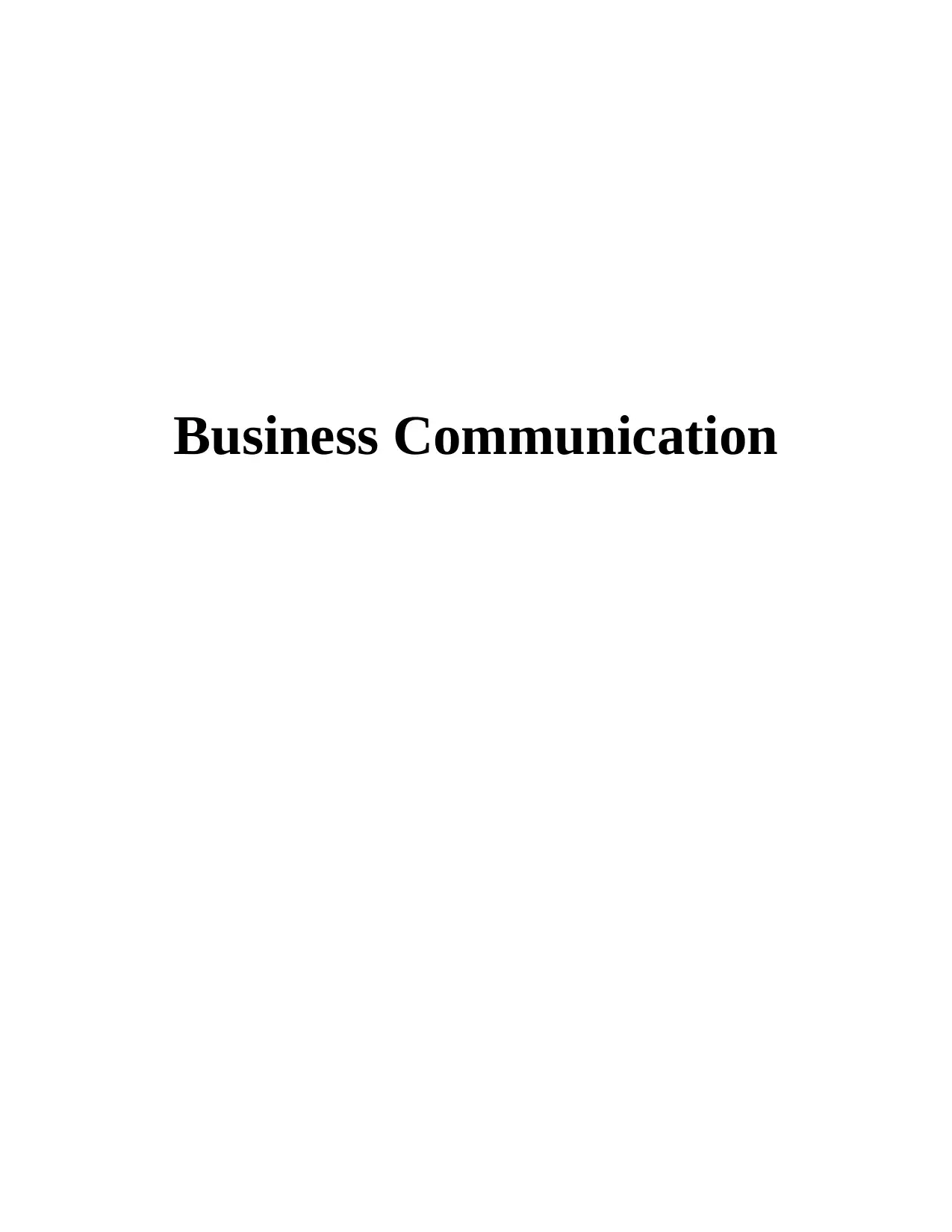
Business Communication
Paraphrase This Document
Need a fresh take? Get an instant paraphrase of this document with our AI Paraphraser
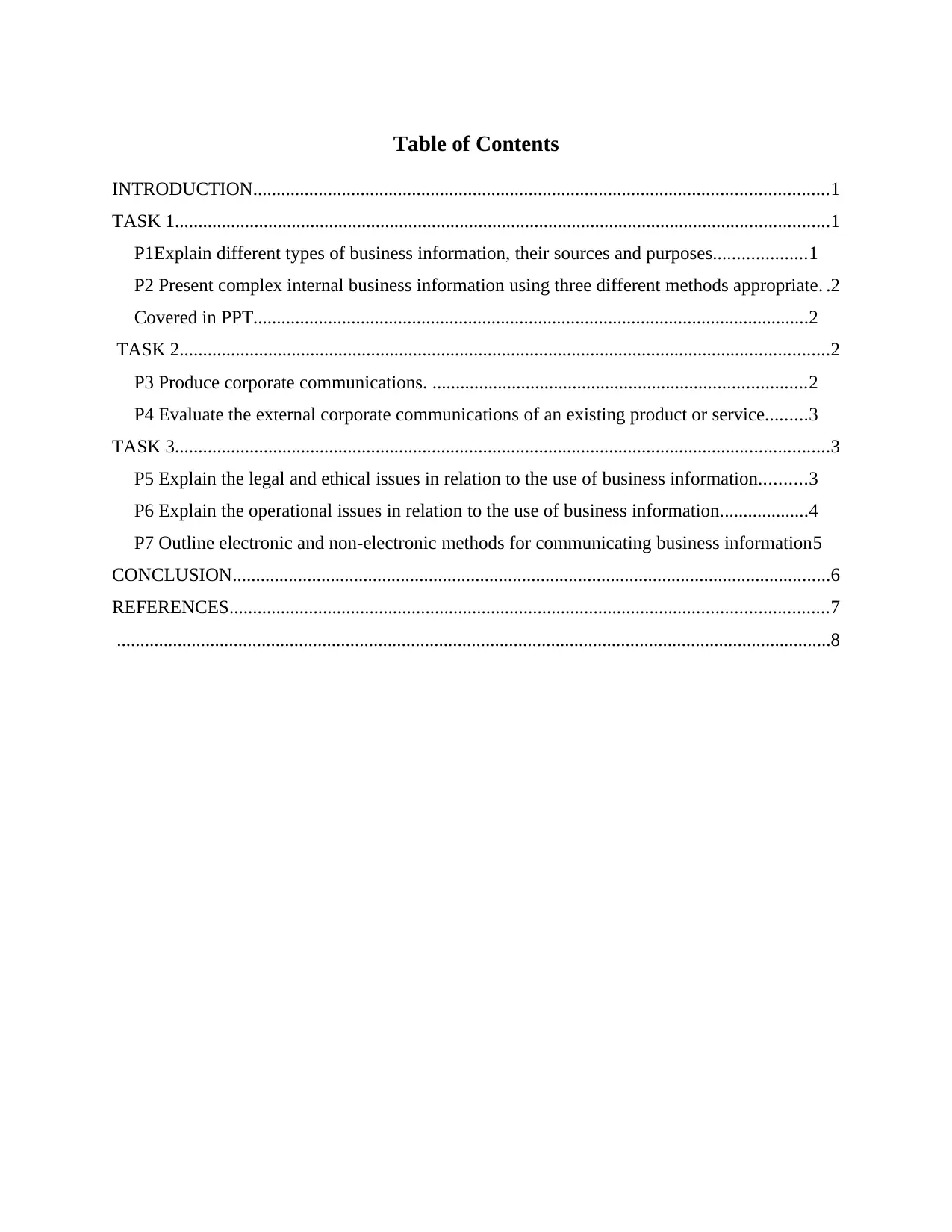
Table of Contents
INTRODUCTION...........................................................................................................................1
TASK 1............................................................................................................................................1
P1Explain different types of business information, their sources and purposes....................1
P2 Present complex internal business information using three different methods appropriate. .2
Covered in PPT.......................................................................................................................2
TASK 2...........................................................................................................................................2
P3 Produce corporate communications. ................................................................................2
P4 Evaluate the external corporate communications of an existing product or service.........3
TASK 3............................................................................................................................................3
P5 Explain the legal and ethical issues in relation to the use of business information..........3
P6 Explain the operational issues in relation to the use of business information...................4
P7 Outline electronic and non-electronic methods for communicating business information5
CONCLUSION................................................................................................................................6
REFERENCES................................................................................................................................7
.........................................................................................................................................................8
INTRODUCTION...........................................................................................................................1
TASK 1............................................................................................................................................1
P1Explain different types of business information, their sources and purposes....................1
P2 Present complex internal business information using three different methods appropriate. .2
Covered in PPT.......................................................................................................................2
TASK 2...........................................................................................................................................2
P3 Produce corporate communications. ................................................................................2
P4 Evaluate the external corporate communications of an existing product or service.........3
TASK 3............................................................................................................................................3
P5 Explain the legal and ethical issues in relation to the use of business information..........3
P6 Explain the operational issues in relation to the use of business information...................4
P7 Outline electronic and non-electronic methods for communicating business information5
CONCLUSION................................................................................................................................6
REFERENCES................................................................................................................................7
.........................................................................................................................................................8

⊘ This is a preview!⊘
Do you want full access?
Subscribe today to unlock all pages.

Trusted by 1+ million students worldwide
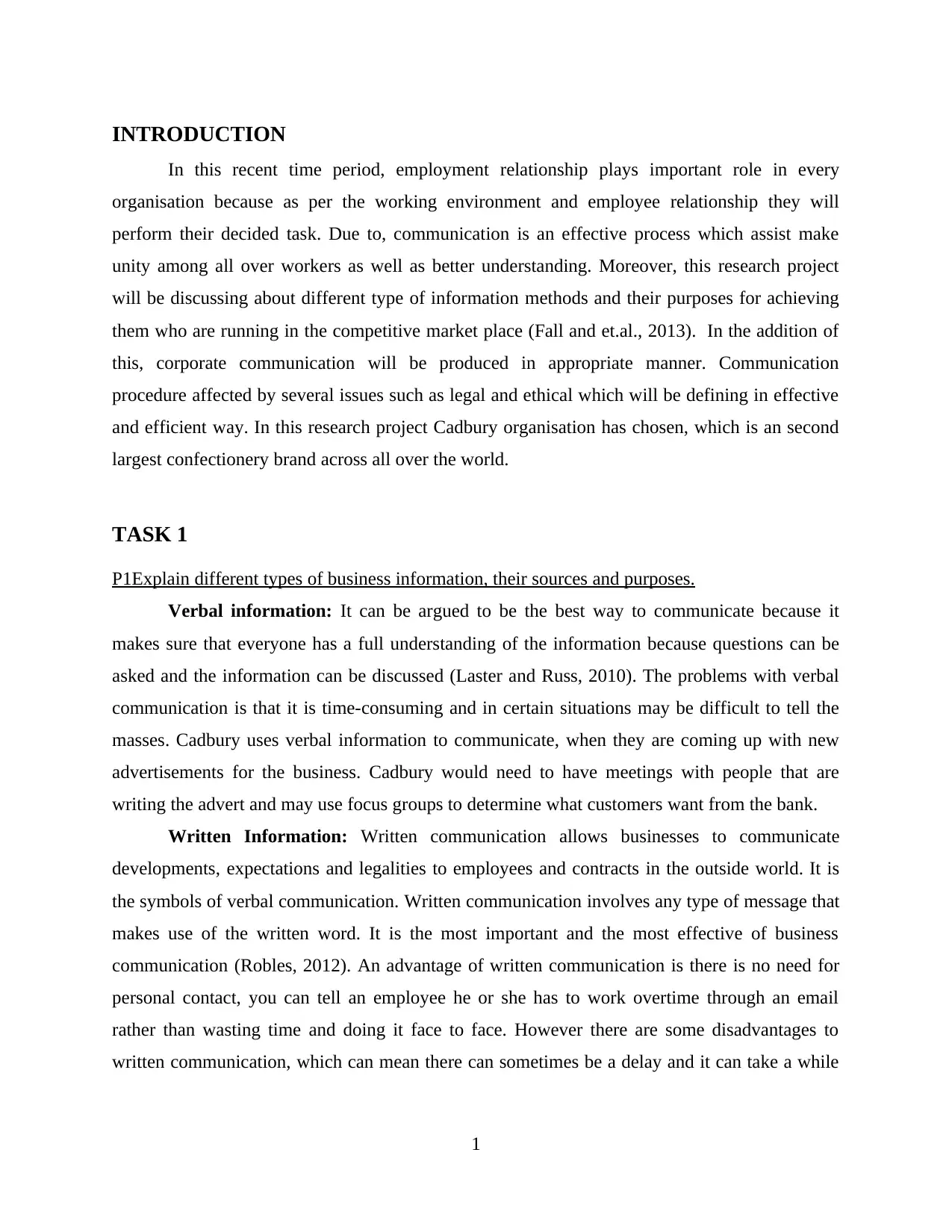
INTRODUCTION
In this recent time period, employment relationship plays important role in every
organisation because as per the working environment and employee relationship they will
perform their decided task. Due to, communication is an effective process which assist make
unity among all over workers as well as better understanding. Moreover, this research project
will be discussing about different type of information methods and their purposes for achieving
them who are running in the competitive market place (Fall and et.al., 2013). In the addition of
this, corporate communication will be produced in appropriate manner. Communication
procedure affected by several issues such as legal and ethical which will be defining in effective
and efficient way. In this research project Cadbury organisation has chosen, which is an second
largest confectionery brand across all over the world.
TASK 1
P1Explain different types of business information, their sources and purposes.
Verbal information: It can be argued to be the best way to communicate because it
makes sure that everyone has a full understanding of the information because questions can be
asked and the information can be discussed (Laster and Russ, 2010). The problems with verbal
communication is that it is time-consuming and in certain situations may be difficult to tell the
masses. Cadbury uses verbal information to communicate, when they are coming up with new
advertisements for the business. Cadbury would need to have meetings with people that are
writing the advert and may use focus groups to determine what customers want from the bank.
Written Information: Written communication allows businesses to communicate
developments, expectations and legalities to employees and contracts in the outside world. It is
the symbols of verbal communication. Written communication involves any type of message that
makes use of the written word. It is the most important and the most effective of business
communication (Robles, 2012). An advantage of written communication is there is no need for
personal contact, you can tell an employee he or she has to work overtime through an email
rather than wasting time and doing it face to face. However there are some disadvantages to
written communication, which can mean there can sometimes be a delay and it can take a while
1
In this recent time period, employment relationship plays important role in every
organisation because as per the working environment and employee relationship they will
perform their decided task. Due to, communication is an effective process which assist make
unity among all over workers as well as better understanding. Moreover, this research project
will be discussing about different type of information methods and their purposes for achieving
them who are running in the competitive market place (Fall and et.al., 2013). In the addition of
this, corporate communication will be produced in appropriate manner. Communication
procedure affected by several issues such as legal and ethical which will be defining in effective
and efficient way. In this research project Cadbury organisation has chosen, which is an second
largest confectionery brand across all over the world.
TASK 1
P1Explain different types of business information, their sources and purposes.
Verbal information: It can be argued to be the best way to communicate because it
makes sure that everyone has a full understanding of the information because questions can be
asked and the information can be discussed (Laster and Russ, 2010). The problems with verbal
communication is that it is time-consuming and in certain situations may be difficult to tell the
masses. Cadbury uses verbal information to communicate, when they are coming up with new
advertisements for the business. Cadbury would need to have meetings with people that are
writing the advert and may use focus groups to determine what customers want from the bank.
Written Information: Written communication allows businesses to communicate
developments, expectations and legalities to employees and contracts in the outside world. It is
the symbols of verbal communication. Written communication involves any type of message that
makes use of the written word. It is the most important and the most effective of business
communication (Robles, 2012). An advantage of written communication is there is no need for
personal contact, you can tell an employee he or she has to work overtime through an email
rather than wasting time and doing it face to face. However there are some disadvantages to
written communication, which can mean there can sometimes be a delay and it can take a while
1
Paraphrase This Document
Need a fresh take? Get an instant paraphrase of this document with our AI Paraphraser
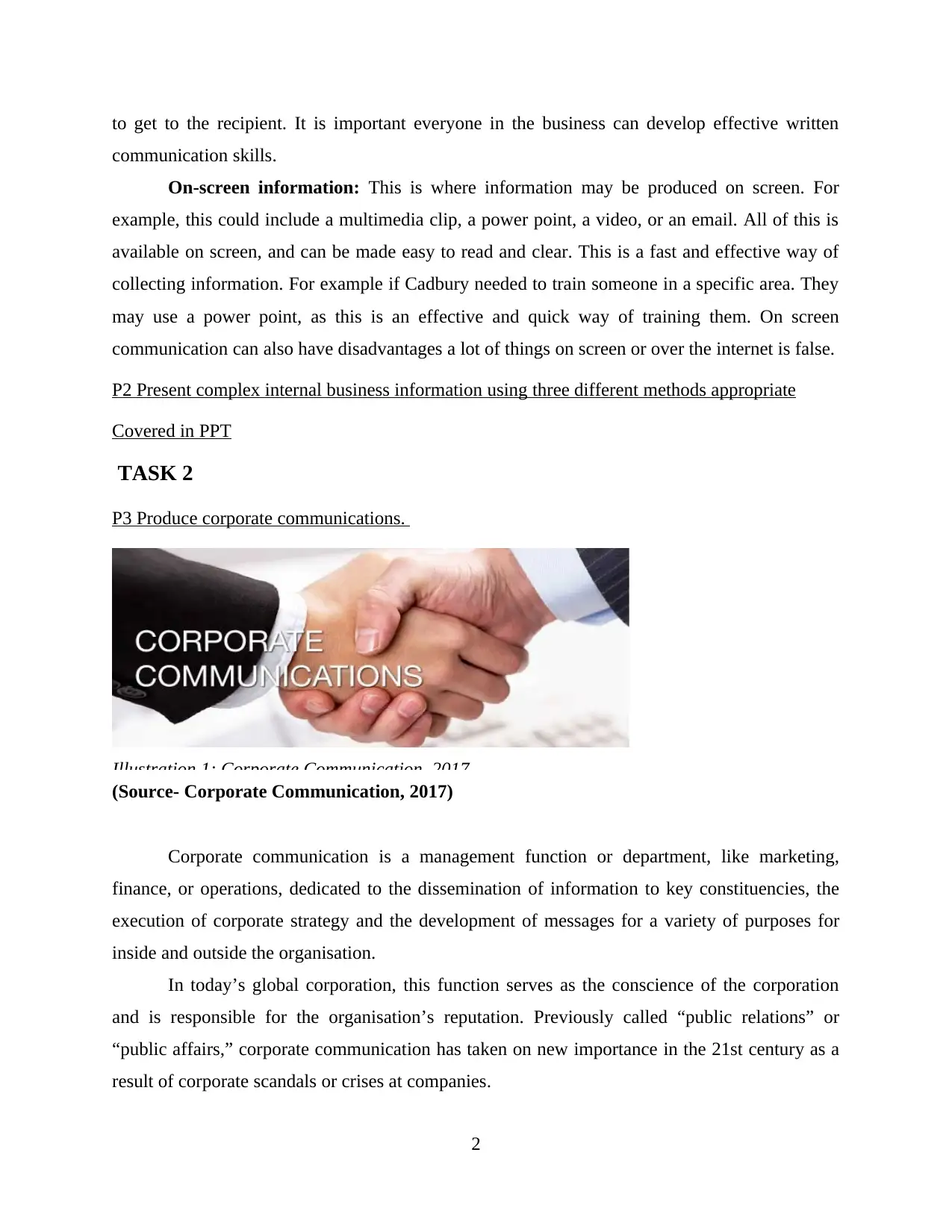
to get to the recipient. It is important everyone in the business can develop effective written
communication skills.
On-screen information: This is where information may be produced on screen. For
example, this could include a multimedia clip, a power point, a video, or an email. All of this is
available on screen, and can be made easy to read and clear. This is a fast and effective way of
collecting information. For example if Cadbury needed to train someone in a specific area. They
may use a power point, as this is an effective and quick way of training them. On screen
communication can also have disadvantages a lot of things on screen or over the internet is false.
P2 Present complex internal business information using three different methods appropriate
Covered in PPT
TASK 2
P3 Produce corporate communications.
Illustration 1: Corporate Communication, 2017
(Source- Corporate Communication, 2017)
Corporate communication is a management function or department, like marketing,
finance, or operations, dedicated to the dissemination of information to key constituencies, the
execution of corporate strategy and the development of messages for a variety of purposes for
inside and outside the organisation.
In today’s global corporation, this function serves as the conscience of the corporation
and is responsible for the organisation’s reputation. Previously called “public relations” or
“public affairs,” corporate communication has taken on new importance in the 21st century as a
result of corporate scandals or crises at companies.
2
communication skills.
On-screen information: This is where information may be produced on screen. For
example, this could include a multimedia clip, a power point, a video, or an email. All of this is
available on screen, and can be made easy to read and clear. This is a fast and effective way of
collecting information. For example if Cadbury needed to train someone in a specific area. They
may use a power point, as this is an effective and quick way of training them. On screen
communication can also have disadvantages a lot of things on screen or over the internet is false.
P2 Present complex internal business information using three different methods appropriate
Covered in PPT
TASK 2
P3 Produce corporate communications.
Illustration 1: Corporate Communication, 2017
(Source- Corporate Communication, 2017)
Corporate communication is a management function or department, like marketing,
finance, or operations, dedicated to the dissemination of information to key constituencies, the
execution of corporate strategy and the development of messages for a variety of purposes for
inside and outside the organisation.
In today’s global corporation, this function serves as the conscience of the corporation
and is responsible for the organisation’s reputation. Previously called “public relations” or
“public affairs,” corporate communication has taken on new importance in the 21st century as a
result of corporate scandals or crises at companies.
2
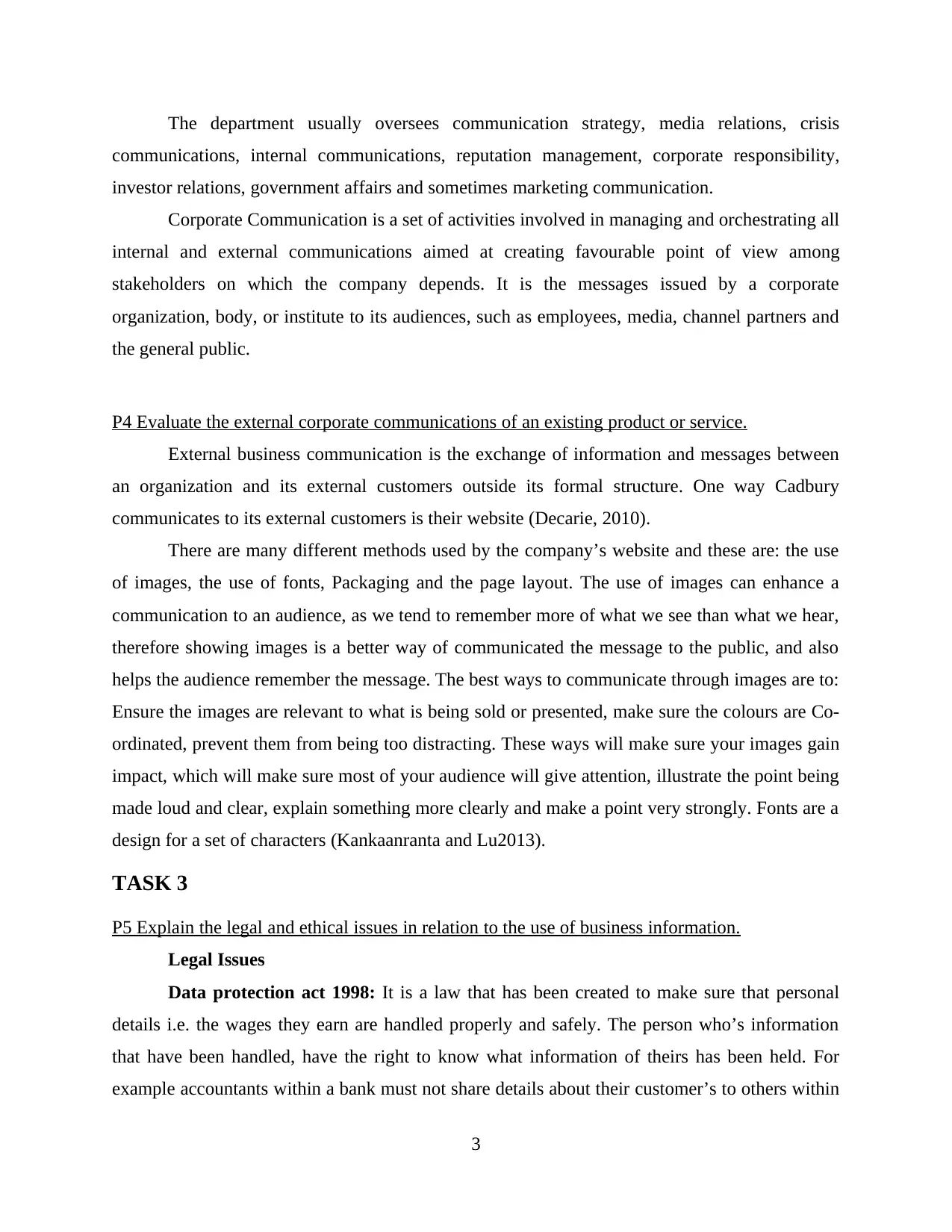
The department usually oversees communication strategy, media relations, crisis
communications, internal communications, reputation management, corporate responsibility,
investor relations, government affairs and sometimes marketing communication.
Corporate Communication is a set of activities involved in managing and orchestrating all
internal and external communications aimed at creating favourable point of view among
stakeholders on which the company depends. It is the messages issued by a corporate
organization, body, or institute to its audiences, such as employees, media, channel partners and
the general public.
P4 Evaluate the external corporate communications of an existing product or service.
External business communication is the exchange of information and messages between
an organization and its external customers outside its formal structure. One way Cadbury
communicates to its external customers is their website (Decarie, 2010).
There are many different methods used by the company’s website and these are: the use
of images, the use of fonts, Packaging and the page layout. The use of images can enhance a
communication to an audience, as we tend to remember more of what we see than what we hear,
therefore showing images is a better way of communicated the message to the public, and also
helps the audience remember the message. The best ways to communicate through images are to:
Ensure the images are relevant to what is being sold or presented, make sure the colours are Co-
ordinated, prevent them from being too distracting. These ways will make sure your images gain
impact, which will make sure most of your audience will give attention, illustrate the point being
made loud and clear, explain something more clearly and make a point very strongly. Fonts are a
design for a set of characters (Kankaanranta and Lu2013).
TASK 3
P5 Explain the legal and ethical issues in relation to the use of business information.
Legal Issues
Data protection act 1998: It is a law that has been created to make sure that personal
details i.e. the wages they earn are handled properly and safely. The person who’s information
that have been handled, have the right to know what information of theirs has been held. For
example accountants within a bank must not share details about their customer’s to others within
3
communications, internal communications, reputation management, corporate responsibility,
investor relations, government affairs and sometimes marketing communication.
Corporate Communication is a set of activities involved in managing and orchestrating all
internal and external communications aimed at creating favourable point of view among
stakeholders on which the company depends. It is the messages issued by a corporate
organization, body, or institute to its audiences, such as employees, media, channel partners and
the general public.
P4 Evaluate the external corporate communications of an existing product or service.
External business communication is the exchange of information and messages between
an organization and its external customers outside its formal structure. One way Cadbury
communicates to its external customers is their website (Decarie, 2010).
There are many different methods used by the company’s website and these are: the use
of images, the use of fonts, Packaging and the page layout. The use of images can enhance a
communication to an audience, as we tend to remember more of what we see than what we hear,
therefore showing images is a better way of communicated the message to the public, and also
helps the audience remember the message. The best ways to communicate through images are to:
Ensure the images are relevant to what is being sold or presented, make sure the colours are Co-
ordinated, prevent them from being too distracting. These ways will make sure your images gain
impact, which will make sure most of your audience will give attention, illustrate the point being
made loud and clear, explain something more clearly and make a point very strongly. Fonts are a
design for a set of characters (Kankaanranta and Lu2013).
TASK 3
P5 Explain the legal and ethical issues in relation to the use of business information.
Legal Issues
Data protection act 1998: It is a law that has been created to make sure that personal
details i.e. the wages they earn are handled properly and safely. The person who’s information
that have been handled, have the right to know what information of theirs has been held. For
example accountants within a bank must not share details about their customer’s to others within
3
⊘ This is a preview!⊘
Do you want full access?
Subscribe today to unlock all pages.

Trusted by 1+ million students worldwide
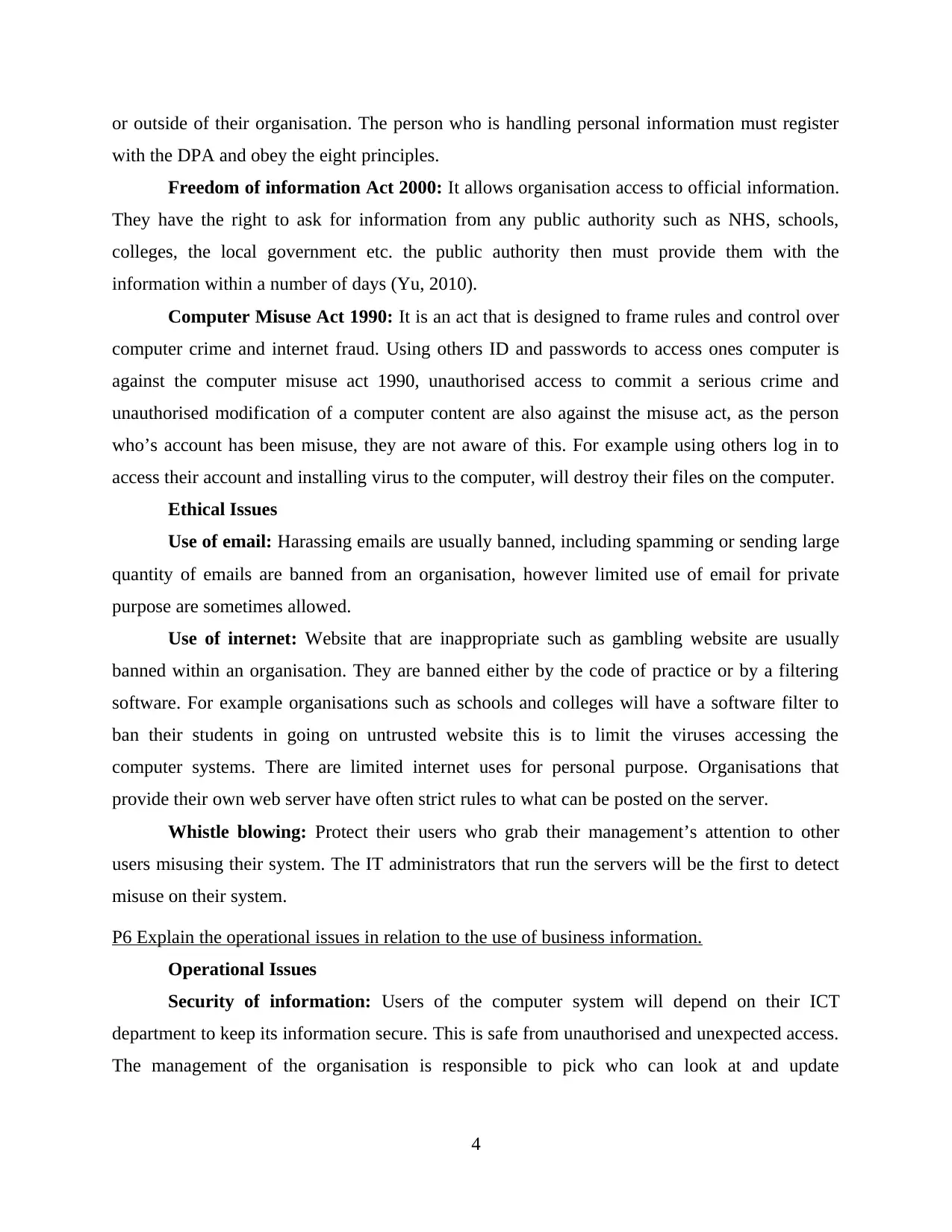
or outside of their organisation. The person who is handling personal information must register
with the DPA and obey the eight principles.
Freedom of information Act 2000: It allows organisation access to official information.
They have the right to ask for information from any public authority such as NHS, schools,
colleges, the local government etc. the public authority then must provide them with the
information within a number of days (Yu, 2010).
Computer Misuse Act 1990: It is an act that is designed to frame rules and control over
computer crime and internet fraud. Using others ID and passwords to access ones computer is
against the computer misuse act 1990, unauthorised access to commit a serious crime and
unauthorised modification of a computer content are also against the misuse act, as the person
who’s account has been misuse, they are not aware of this. For example using others log in to
access their account and installing virus to the computer, will destroy their files on the computer.
Ethical Issues
Use of email: Harassing emails are usually banned, including spamming or sending large
quantity of emails are banned from an organisation, however limited use of email for private
purpose are sometimes allowed.
Use of internet: Website that are inappropriate such as gambling website are usually
banned within an organisation. They are banned either by the code of practice or by a filtering
software. For example organisations such as schools and colleges will have a software filter to
ban their students in going on untrusted website this is to limit the viruses accessing the
computer systems. There are limited internet uses for personal purpose. Organisations that
provide their own web server have often strict rules to what can be posted on the server.
Whistle blowing: Protect their users who grab their management’s attention to other
users misusing their system. The IT administrators that run the servers will be the first to detect
misuse on their system.
P6 Explain the operational issues in relation to the use of business information.
Operational Issues
Security of information: Users of the computer system will depend on their ICT
department to keep its information secure. This is safe from unauthorised and unexpected access.
The management of the organisation is responsible to pick who can look at and update
4
with the DPA and obey the eight principles.
Freedom of information Act 2000: It allows organisation access to official information.
They have the right to ask for information from any public authority such as NHS, schools,
colleges, the local government etc. the public authority then must provide them with the
information within a number of days (Yu, 2010).
Computer Misuse Act 1990: It is an act that is designed to frame rules and control over
computer crime and internet fraud. Using others ID and passwords to access ones computer is
against the computer misuse act 1990, unauthorised access to commit a serious crime and
unauthorised modification of a computer content are also against the misuse act, as the person
who’s account has been misuse, they are not aware of this. For example using others log in to
access their account and installing virus to the computer, will destroy their files on the computer.
Ethical Issues
Use of email: Harassing emails are usually banned, including spamming or sending large
quantity of emails are banned from an organisation, however limited use of email for private
purpose are sometimes allowed.
Use of internet: Website that are inappropriate such as gambling website are usually
banned within an organisation. They are banned either by the code of practice or by a filtering
software. For example organisations such as schools and colleges will have a software filter to
ban their students in going on untrusted website this is to limit the viruses accessing the
computer systems. There are limited internet uses for personal purpose. Organisations that
provide their own web server have often strict rules to what can be posted on the server.
Whistle blowing: Protect their users who grab their management’s attention to other
users misusing their system. The IT administrators that run the servers will be the first to detect
misuse on their system.
P6 Explain the operational issues in relation to the use of business information.
Operational Issues
Security of information: Users of the computer system will depend on their ICT
department to keep its information secure. This is safe from unauthorised and unexpected access.
The management of the organisation is responsible to pick who can look at and update
4
Paraphrase This Document
Need a fresh take? Get an instant paraphrase of this document with our AI Paraphraser
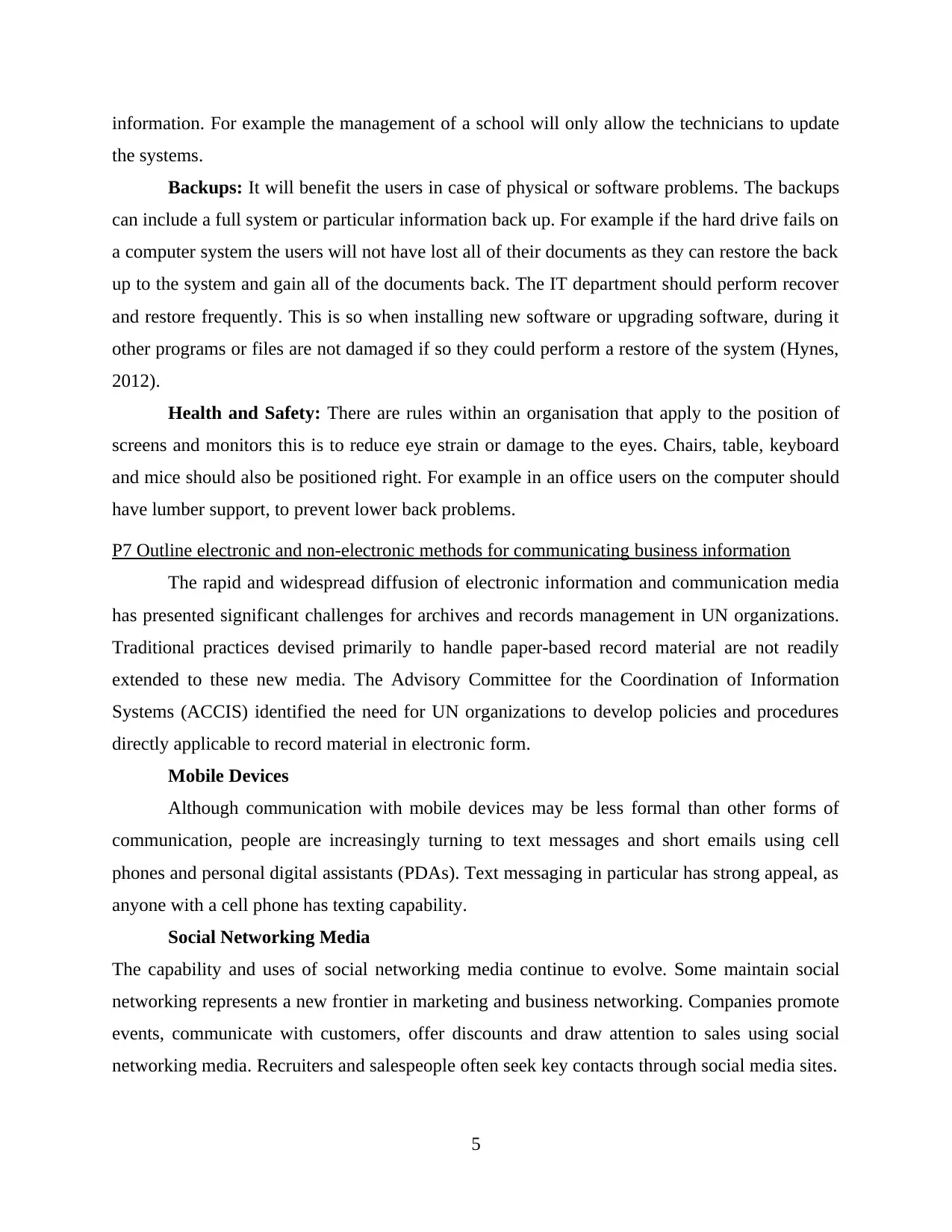
information. For example the management of a school will only allow the technicians to update
the systems.
Backups: It will benefit the users in case of physical or software problems. The backups
can include a full system or particular information back up. For example if the hard drive fails on
a computer system the users will not have lost all of their documents as they can restore the back
up to the system and gain all of the documents back. The IT department should perform recover
and restore frequently. This is so when installing new software or upgrading software, during it
other programs or files are not damaged if so they could perform a restore of the system (Hynes,
2012).
Health and Safety: There are rules within an organisation that apply to the position of
screens and monitors this is to reduce eye strain or damage to the eyes. Chairs, table, keyboard
and mice should also be positioned right. For example in an office users on the computer should
have lumber support, to prevent lower back problems.
P7 Outline electronic and non-electronic methods for communicating business information
The rapid and widespread diffusion of electronic information and communication media
has presented significant challenges for archives and records management in UN organizations.
Traditional practices devised primarily to handle paper‐based record material are not readily
extended to these new media. The Advisory Committee for the Coordination of Information
Systems (ACCIS) identified the need for UN organizations to develop policies and procedures
directly applicable to record material in electronic form.
Mobile Devices
Although communication with mobile devices may be less formal than other forms of
communication, people are increasingly turning to text messages and short emails using cell
phones and personal digital assistants (PDAs). Text messaging in particular has strong appeal, as
anyone with a cell phone has texting capability.
Social Networking Media
The capability and uses of social networking media continue to evolve. Some maintain social
networking represents a new frontier in marketing and business networking. Companies promote
events, communicate with customers, offer discounts and draw attention to sales using social
networking media. Recruiters and salespeople often seek key contacts through social media sites.
5
the systems.
Backups: It will benefit the users in case of physical or software problems. The backups
can include a full system or particular information back up. For example if the hard drive fails on
a computer system the users will not have lost all of their documents as they can restore the back
up to the system and gain all of the documents back. The IT department should perform recover
and restore frequently. This is so when installing new software or upgrading software, during it
other programs or files are not damaged if so they could perform a restore of the system (Hynes,
2012).
Health and Safety: There are rules within an organisation that apply to the position of
screens and monitors this is to reduce eye strain or damage to the eyes. Chairs, table, keyboard
and mice should also be positioned right. For example in an office users on the computer should
have lumber support, to prevent lower back problems.
P7 Outline electronic and non-electronic methods for communicating business information
The rapid and widespread diffusion of electronic information and communication media
has presented significant challenges for archives and records management in UN organizations.
Traditional practices devised primarily to handle paper‐based record material are not readily
extended to these new media. The Advisory Committee for the Coordination of Information
Systems (ACCIS) identified the need for UN organizations to develop policies and procedures
directly applicable to record material in electronic form.
Mobile Devices
Although communication with mobile devices may be less formal than other forms of
communication, people are increasingly turning to text messages and short emails using cell
phones and personal digital assistants (PDAs). Text messaging in particular has strong appeal, as
anyone with a cell phone has texting capability.
Social Networking Media
The capability and uses of social networking media continue to evolve. Some maintain social
networking represents a new frontier in marketing and business networking. Companies promote
events, communicate with customers, offer discounts and draw attention to sales using social
networking media. Recruiters and salespeople often seek key contacts through social media sites.
5
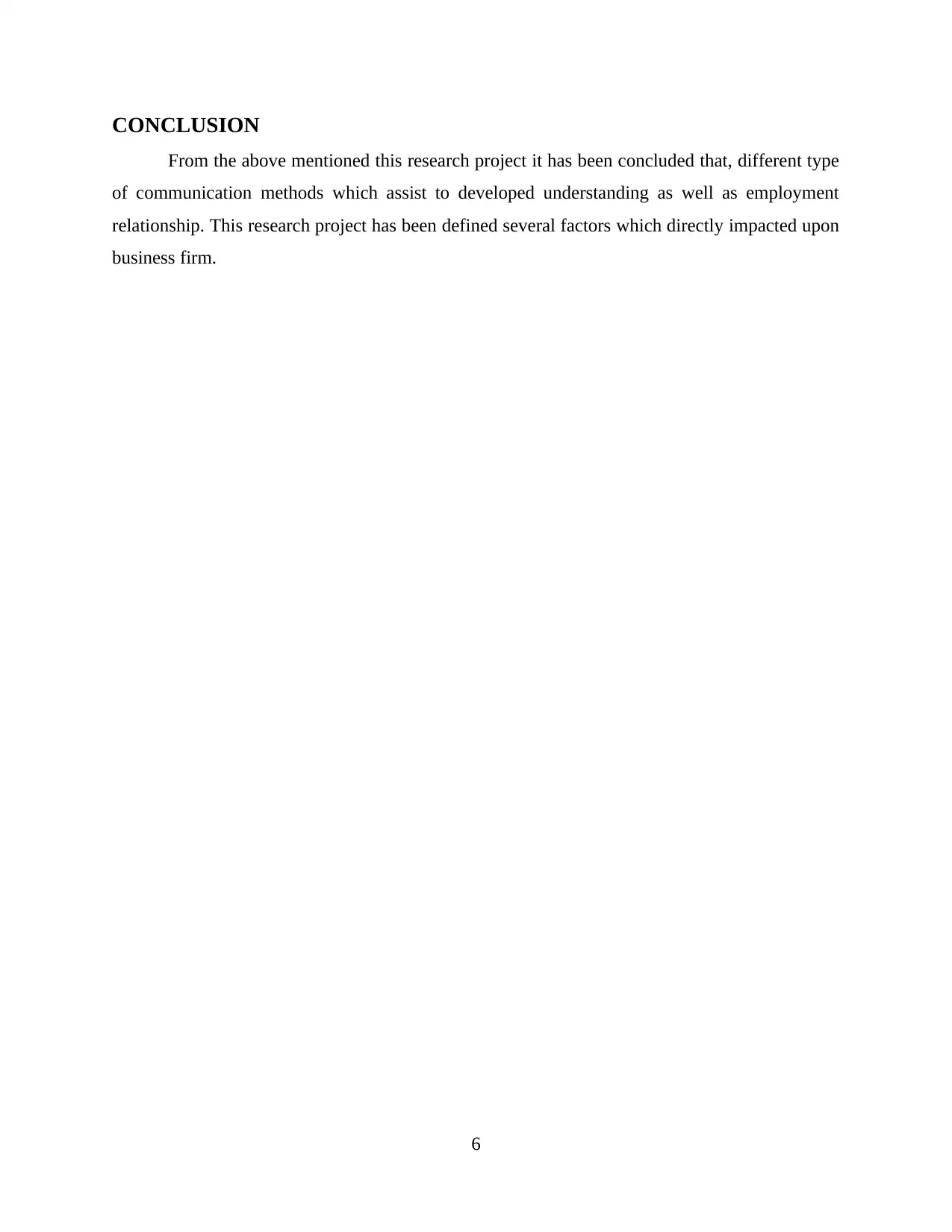
CONCLUSION
From the above mentioned this research project it has been concluded that, different type
of communication methods which assist to developed understanding as well as employment
relationship. This research project has been defined several factors which directly impacted upon
business firm.
6
From the above mentioned this research project it has been concluded that, different type
of communication methods which assist to developed understanding as well as employment
relationship. This research project has been defined several factors which directly impacted upon
business firm.
6
⊘ This is a preview!⊘
Do you want full access?
Subscribe today to unlock all pages.

Trusted by 1+ million students worldwide
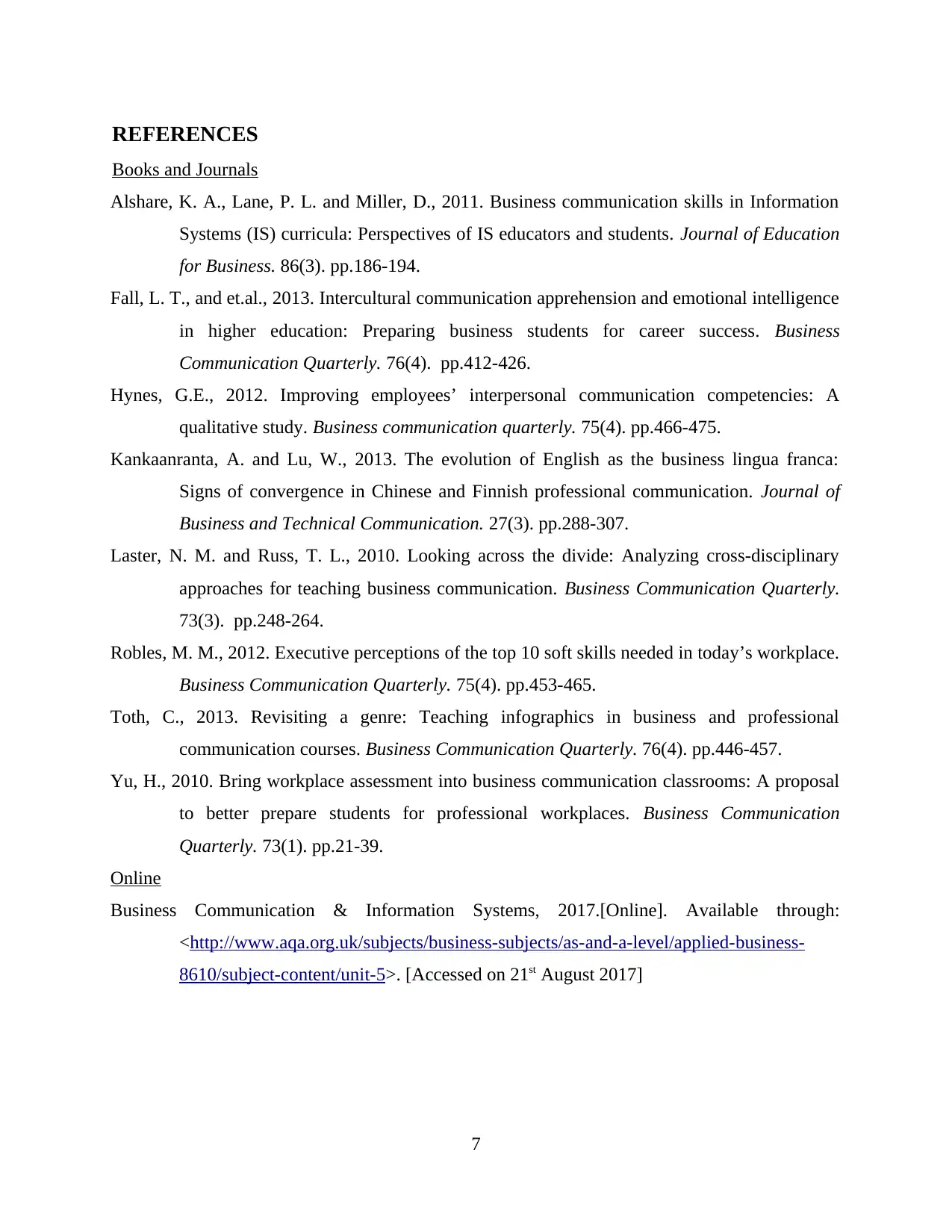
REFERENCES
Books and Journals
Alshare, K. A., Lane, P. L. and Miller, D., 2011. Business communication skills in Information
Systems (IS) curricula: Perspectives of IS educators and students. Journal of Education
for Business. 86(3). pp.186-194.
Fall, L. T., and et.al., 2013. Intercultural communication apprehension and emotional intelligence
in higher education: Preparing business students for career success. Business
Communication Quarterly. 76(4). pp.412-426.
Hynes, G.E., 2012. Improving employees’ interpersonal communication competencies: A
qualitative study. Business communication quarterly. 75(4). pp.466-475.
Kankaanranta, A. and Lu, W., 2013. The evolution of English as the business lingua franca:
Signs of convergence in Chinese and Finnish professional communication. Journal of
Business and Technical Communication. 27(3). pp.288-307.
Laster, N. M. and Russ, T. L., 2010. Looking across the divide: Analyzing cross-disciplinary
approaches for teaching business communication. Business Communication Quarterly.
73(3). pp.248-264.
Robles, M. M., 2012. Executive perceptions of the top 10 soft skills needed in today’s workplace.
Business Communication Quarterly. 75(4). pp.453-465.
Toth, C., 2013. Revisiting a genre: Teaching infographics in business and professional
communication courses. Business Communication Quarterly. 76(4). pp.446-457.
Yu, H., 2010. Bring workplace assessment into business communication classrooms: A proposal
to better prepare students for professional workplaces. Business Communication
Quarterly. 73(1). pp.21-39.
Online
Business Communication & Information Systems, 2017.[Online]. Available through:
<http://www.aqa.org.uk/subjects/business-subjects/as-and-a-level/applied-business-
8610/subject-content/unit-5>. [Accessed on 21st August 2017]
7
Books and Journals
Alshare, K. A., Lane, P. L. and Miller, D., 2011. Business communication skills in Information
Systems (IS) curricula: Perspectives of IS educators and students. Journal of Education
for Business. 86(3). pp.186-194.
Fall, L. T., and et.al., 2013. Intercultural communication apprehension and emotional intelligence
in higher education: Preparing business students for career success. Business
Communication Quarterly. 76(4). pp.412-426.
Hynes, G.E., 2012. Improving employees’ interpersonal communication competencies: A
qualitative study. Business communication quarterly. 75(4). pp.466-475.
Kankaanranta, A. and Lu, W., 2013. The evolution of English as the business lingua franca:
Signs of convergence in Chinese and Finnish professional communication. Journal of
Business and Technical Communication. 27(3). pp.288-307.
Laster, N. M. and Russ, T. L., 2010. Looking across the divide: Analyzing cross-disciplinary
approaches for teaching business communication. Business Communication Quarterly.
73(3). pp.248-264.
Robles, M. M., 2012. Executive perceptions of the top 10 soft skills needed in today’s workplace.
Business Communication Quarterly. 75(4). pp.453-465.
Toth, C., 2013. Revisiting a genre: Teaching infographics in business and professional
communication courses. Business Communication Quarterly. 76(4). pp.446-457.
Yu, H., 2010. Bring workplace assessment into business communication classrooms: A proposal
to better prepare students for professional workplaces. Business Communication
Quarterly. 73(1). pp.21-39.
Online
Business Communication & Information Systems, 2017.[Online]. Available through:
<http://www.aqa.org.uk/subjects/business-subjects/as-and-a-level/applied-business-
8610/subject-content/unit-5>. [Accessed on 21st August 2017]
7
1 out of 10
Related Documents
Your All-in-One AI-Powered Toolkit for Academic Success.
+13062052269
info@desklib.com
Available 24*7 on WhatsApp / Email
![[object Object]](/_next/static/media/star-bottom.7253800d.svg)
Unlock your academic potential
Copyright © 2020–2026 A2Z Services. All Rights Reserved. Developed and managed by ZUCOL.





